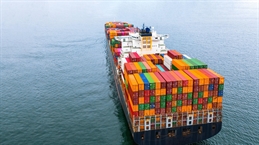
Fewer containers were lost at sea in 2022 compared to the preceding year, according to the The World Shipping Council (WSC) in its newly-released annual report.
WSC said this revealed a "positive development" in container safety within the international liner shipping industry.
The report covers the year 2022, showing that 661 containers were lost overboard during the year.
"The reduction in containers lost at sea in 2022 is positive news, but there is no time for complacency. Every container lost at sea will always be one too many and we will continue with our efforts to make the sea a safer place to work, and to protect the environment and cargo by reducing the number of containers lost at sea," said John Butler, president & CEO of the WSC.
Proper packing, stowage and securing of containers, and reporting of correct weight are key to the safety of a container ship, its crew, and its cargo, to shore-based workers, and to the environment.
WSC noted that the responsibility for container safety is shared across the supply chain, and every day liner carriers work with their partners to prevent incidents and ensure safe container transport.
Fewer containers lost at sea
Last year's 661 containers lost at sea represents less than one thousandth of 1% (0.00026%) of the 250 million containers currently shipped each year, with cargo transported valued at more than US$7 trillion.
"Reviewing the results of the total fifteen-year period surveyed (2008-2022), on average 1,566 containers were lost at sea each year," WSC added, noting that the liner shipping industry works continuously to further enhance container safety, partnering with governments and other stakeholders to reduce the number of containers lost at sea.
One of the programs aimed at reducing container losses at sea is the MARIN Top Tier Study.
WSC is a partner and several member lines and a range of maritime stakeholder started the project in 2021.
The statement noted that the research undertaken has already delivered concrete data on the causes of containers overboard and how to prevent further incidents — this includes training materials to raise awareness of the risk of various kinds of parametric rolling, as well as tools such as videos and calculators to help prevent and, if necessary, manage such dangerous situations.
TopTier research is currently taking place into container and lashing gear strength, stowage planning and optimization, guidelines for vessel operations, and voyage planning.
WSC said more results are to come in the form of industry best practices, updated safety standards, and recommendations as the project enters its third and final year.
On the regulatory side, there has been progress on two key regulatory efforts for container safety that WSC is engaged in at the IMO.
The Maritime Safety Committee (MSC 105) approved a revision of IMO's guidelines for container inspection programs, among other clarifying that it applies to all cargo, adding guidance from the CTU Code, as well as inspections for visible pest contamination.
WSC has also for many years been advocating mandatory reporting of containers lost at sea, and have contributed in the IMO CCC 8, to the development of a system for mandatory reporting of containers lost at sea.
The proposal will be considered by MSC 107 in May-June this year. If approved, the system can be adopted at MSC 108 next spring, making international mandatory reporting requirements for containers lost as sea effective as of 2026.
WSC has been reporting on the number of Containers Lost at Sea since 2011, with data starting 2008.
It added that many improvements have been achieved over the years including improvements to the Safety of Life at Sea (SOLAS) convention, creation and promotion of the Code of Practice for Packing of Cargo Transport Units (CTU Code) and ISO standards for container lashing equipment and corner castings.



